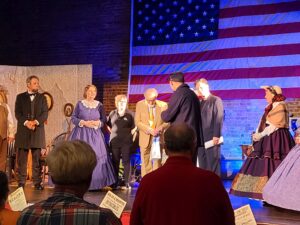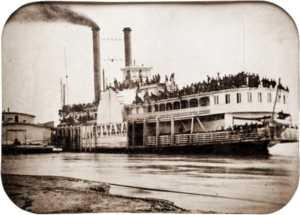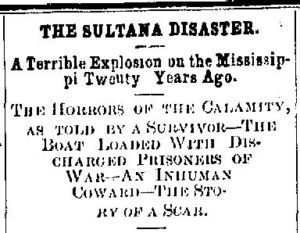Last weekend we attended a play, Long Journey Home, The Charles T. Kruse Civil War Story, held in the recently renovated St. Marys Theater. The play is based on a true story with an Auglaize County connection.

Cast of Long Journey Home, Charles T. Kruse Civil War Story, St Marys Theater, 20 Aug 2023
I learned of this interesting story several years ago at a Mercer County Chapter OGS meeting when Dr. Todd Spieles relayed the story of St. Marys native Charles Kruse, who wrote letters while serving in the war and sent them home to his parents. Kruse’s family saved those letters all these years and they were eventually made public.
Michael R. Hurwitz wrote, directed, and produced the one-act play we saw last weekend, which is based on Kruse’s letters and Dr. Spieles’ research. The play was very well done and the acting was exceptional. It was narrated by professional actor and Ohio native Gary Sandy, who is probably best known for his role as Andy Travis in the old TV comedy series WKRP in Cincinnati. Also, kudos to the stage set and the costumes. We enjoyed the play very much.

Cast of Long Journey Home, Charles T. Kruse Civil War Story, St Marys Theater, 20 Aug 2023
I knew most of Charles Kruse’s story from the genealogy talk I heard years ago, but during the play specific parts of Kruse’s story sounded eerily familiar and reminded me of a research report I did a few years ago. I even wrote a blog post about it.
I’ll cut to the chase and spoil the Kruse story here. In a nutshell, Kruse served in the 50th Ohio Infantry for about a year and a half before he was captured at the Battle of Franklin, Tennessee, on 30 November 1864. He was sent from Cahaba, Alabama, prison camp to Andersonville, Georgia, prison camp, [1] two of the worst Confederate prisoner of war camps. In April 1865 General Lee surrendered his troops to General Grant and the war was nearly over. Kruse, who had survived two terrible prison camps, was allowed to go home. Kruse, with over 1951 paroled soldiers mainly from Ohio, Indiana, Kentucky, Michigan, and East Tennessee, 22 guards from the 58th OVI, 85 crew members, and 70 fare-paying cabin passengers, boarded the steamboat Sultana, at Vicksburg. The ship was extremely overcrowded. There were 2137 passengers onboard a boat that was designed to carry 376 passengers. Kruse and over 1200 other men perished near Memphis, Tennessee, at about 1:00 a.m. on 27 April 1865, when three of the four boat’s boilers exploded. It is the worst maritime disaster in U.S. history.
The final details of Kruse’s story were the same details of a research project I did several years ago. It was the story of Johann “John” Bahn, an Ohio soldier who served in the 183rd Ohio Infantry, captured at the Battle of Franklin, Tennessee, on 30 November 1864, was sent to Cahaba, Alabama, prison camp, survived the camp, boarded the Sultana to go home, and perished when the boat exploded on 27 April 1865. You can read the blog post I wrote about John Bahn’s story several years ago: Who Was Henry Trisel’s Adopted Son?
I learned of John Bahn’s tragic story while researching a tombstone in our church cemetery. John Bahn, a civil war soldier who perished on the Sultana, left behind a widow and infant son in Cincinnati. The infant son never knew his biological father. John Bahn’s widow remarried and the family moved to near Chattanooga, Ohio, around 1870. John Bahn’s son, also named John Bahn (1865-1876), is buried in Zion Lutheran Cemetery at Chatt. John Bahn’s widow, who married Henry Trisel, is buried in East Bethel Cemetery, a couple miles northeast of Chatt.
The son of a soldier who perished on the Sultana is buried in Zion Chatt’s cemetery. That is why some of the details of the story sounded so familiar. The similarities between the two soldiers, Charles T. Kruse and Johann Bahn:
- Both enlisted in the Ohio Infantry, Kruse in the 50th, Bahn in the 183rd
- Both fought in and survived the fierce Battle of Franklin, Tennessee
- Both were taken to Cahaba Prison Camp [Note: CivilWarPrisoners.com indicates that Kruse was at Cahaba before being transferred to Andersonville] [1]
- Both survived the terrible conditions at the Confederate camp(s)
- Both were on their way back to Ohio on the Sultana
- Both perished when the Sultana exploded
Sad stories indeed. Most war-time stores are.

Sultana
From the website CivilWarPrisoners.com : “The explosion of the steamboat Sultana on April 27, 1865 in the middle of the night on the Mississippi River near Memphis resulted in what is probably the greatest loss of life in a naval disaster in American history. The ship was rated to carry only about 375 passengers, but nearly 2,200 Union prisoners from Andersonville and Cahaba prisons were crowded onto the boat that fateful night. The Sultana’s boilers exploded at 1 a.m. in the morning of April 27 seven miles north of Memphis, flinging men already weakened from their imprisonment into the flooded, icy river. Many prisoners were seriously burned and injured. There are 1,221 verified deaths from existing sources, including Adjutant General (AG) reports. Many Sultana experts put the death toll at 1,500 to 1,800, making the Sultana death toll higher than the Titanic. About 800 survivors were found and taken to hospital in Memphis, but nearly 300 died there from burns and exposure. Many bodies were never found. Men simply floated down the river, past Memphis on to their death.”

Miami Helmet, Piqua Ohio, 1 Oct 1885, Sultana
The following news article was published in 1885, 20 years after the Sultana exploded and sank, the recollections of Sultana survivor George M. Safford. Safford had also been a prisoner at Cahaba. After the war Safford was a railroad conductor and later a brakeman. The article is rather long but is informative and interesting:
THE SULTANA DISASTER
A Terrible Explosion on the Mississippi Twenty Years Ago
The Horrors of the Calamity, as told by a Survivor-The Boat Loaded With Discharged Prisoners of War-An Inhuman Coward-The Story of a Scar.
Correspondence of the Enquirer, Richmond Ind., Sept. 18, ‘85
Twenty years ago the civilized world was startled by the awfulest river horror that had ever occurred…and there are many people in Ohio and Indiana who still mourn for dear ones who had started home to them and never arrived. There are but few survivors living now who were on board the ill-fated steamer Sultana when she exploded her boilers…
…Noticing a large scar on [his] neck that extended up into his hair, the reporter asked him if it was the result of a railroad accident. Worse than that, was the answer I received that when the steamer Sultana blew up…
…The Sultana disaster occurred April 28, 1865, at two o’clock in the morning. It was the most appalling of water horrors…The steamer was a Cincinnati built boat intended to run in the Ohio River trade above the Queen City, but during the war she was placed in the trade between St. Louis and New Orleans. She was lengthened and broadened to a very large carrying capacity, her cabin stopped at the chimneys, leaving a large open space on the cabin and boiler deck, suitable for light freight or convenient for the transportation of troops. I belonged to the Tenth Indiana Cavalry, and was one of the unfortunate devils who took the first degree in rebel prison life at Libby, and the last at Andersonville. Under an arrangement between our Government and the officials of the C.S.A. all, or nearly all, the Union prisoners contained at Andersonville, Ga, Meridian, Miss, United States lines and encamped near Vicksburg, at Four-Mile Bridge, on the Jackson and Vicksburg Railroad. These prisoners were under the charge of three Commissioners of the Confederate States.
You can well imagine how we fellows who had lived a living death for months felt at the prospect of seeing home and friends again, and we were actually lighthearted and had almost forgotten our sufferings. When…the Sultana arrived she was greeted with cheers, and as General Banks walked down her gangplank men cried for joy and hugged each other like school-girls.
But our joy was short duration, for the Sultana brought us the news of the assassination of President Lincoln. The effect of this news is simply indescribable. To be immured for months in hell was bad enough, but to have our beloved President shot like a dog by a coward who used his pistol from behind was more than we could stand. The camp was soon in an uproar, and loud threats of vengeance were made…
It was determined to send home at once all ex-prisoners of war, as the war was virtually over…The prisoners were divided or parceled off by States and the next to the last lot…was composed of soldiers from Ohio, Indiana, Kentucky and East Tennessee. This lot was loaded on the Sultana. On board the boat [were] over twenty-one hundred soldiers and ex-prisoners, with the crew and about forty passengers, eight of them women, and six small children, making a grand total of over twenty-two hundred souls on board.
As the boat swung out into the river and we realized that at last we were bound for God’s country, home and friends, we lustily cheered the grand old flag…That old flag never seemed to dear before, and many an old veteran who had borne the horrors of Andersonville without a sign of weakening broke down and cried like a child.
The boat left Vicksburg on the night of April 24th, about half-past eight, and arrived at Memphis on the afternoon of the 27th…The machinery was out of repair and we laid at Memphis until after one o’clock on the morning of the 28th. A number of the passengers were awake and were singing some of our old camp songs, little suspecting what was before. When we were about six miles above Memphis there was a sudden roar, the boat trembled like a leaf, and in an instant the white steam had enveloped her from stem to stern. Our songs were changed to cries, and above the crashing timbers and oaths could be heard the shrieking of women and screams of the children. Men groped through the dense smoke and hot steam, women rushed from their state-rooms, and a scene of wildest confusions prevailed. All this in less time than it takes to tell it.
Suddenly the awful cry went up, The Boat Is On Fire!…flames…darted up the woodwork…dry timbers…and cabins burned like paper. In ten minutes’ time the craft was one sheet of flame, driving the survivors into the water.
The Mississippi at that time was more than bank full, the western bank overflowed for many miles…not an officer of the boat left living to tell the poor wretches what to do…No small boats or life-preservers were in sight…All there was left for that mass of humanity to do was to jump into the water and try for their lives, perhaps ten miles from one shore and one mile from the other, with a strong, swift current to wash them out when almost within arm’s length of the east bank. About five hundred wretches gathered on the bow of the boat, and were seemingly safe, for the hulk was rapidly drifting toward land, and before the flames would reach them they would be so near shore that it would not be much trouble to reach it. Suddenly the hulk turned out stream, the wind gave fresh impetus to the fire, and the flames dashed into that crowd of shrieking, crying and praying humanity driving them into the water, from which not fifty escaped alive.
The river in the evening was lighted up by the flames, and on its broad bosom could be seen hundreds and hundreds of struggling men, catching at everything coming near them. The water was cold and chilly, and many a strong swimmer was taken with cramps and went down forever. Some were uninjured and some had already received their death-wounds, but with that tenacity that had brought them through many months of danger, sickness and suffering, they clung to life until forced to surrender to the mighty flood, and, throwing up their arms in one last effort, would sink to a water grave.
Although twenty years have passed, the recollections of that scene are as fresh in my memory as though occurring yesterday. I was fortunate enough to have some knowledge of river steamers, and, knowing where the life-preservers were kept, I found one for myself and another for my companion, and assisted five of the ladies over the side of the boat from the cabin deck, after buckling on life-preservers, into the water before the flames compelled me to take the same leap.
AN INHUMAN COWARD
I had fastened a preserver under the arms of a very handsome little lady from Columbus, Ohio, who displayed more grit than half the men, and as I turned to help another, a man, or the semblance of a man, jerked the life-preserver from the Columbus lady and she sank before his eyes. Thank God, the cowardly dog was not a soldier, but was one of the crew. I have never seen him since, but I have his picture so stamped on my memory that I would know him if I met him anywhere under any circumstances. Even now I would hate to trust myself if I should meet him.
Besides this lady four of the others were lost also. After I was compelled to take to the water I had to fight my way through a mass of humanity anxious only to grasp at the last thing within reach, and several times I came near being pulled under by drowning men. Being an expert swimmer, as quickly as possible I swam away from the crowd that hovered near the burning boat, like moths near the flame, hoping against that something would turn up to help them ashore, or that they might secure a strong a strong board or plank, or anything they knew not nor cared not, only fearing to trust themselves in the inky darkness of the muddy river away from the circle of light made by the burning steamer. Before the explosion myself and partner were sitting together over the, or on the hatch that led down on the after guard by the ladies’ cabin. We had resolved to stay together, but in case we were separated to swim to the east, hoping to land on the bluff bank on that side instead of trusting to the bottoms of the west bank, although the boat at the time of the explosion was nearer to the willow of what would have been the west shore in an ordinary state of water. We were separated the instant we touched the water, and did not meet again until the afternoon of the next day. I was picked up by a row-boat from the gun-boat Essex and he by another, both of us partially unconscious, both saved by life-preservers.
After swimming away from the crowd around the burning steamer my left arm and both knew were cramped by the cold water, and my left leg was almost useless until the next day. The debilitated condition of the soldiers, and the water extremely cold from the melted snows of the Missouri River, was mainly the cause of such great mortality. I was informed by Major Williams, at that time Provost Marshal for General Washburn at Memphis, that the loss of life exceeded eighteen hundred. It was openly charged at the time that the Quartermaster at Vicksburg and the Captain of the Sultana, Cass Mason, had made money by placing six or eight hundred more men on the boat than her capacity would stand I did at the time, and General Dann at Vicksburg came in for a large share of censure from many friends for allowing so many men on our steamer. Captain Mason was lost, but the pilot on watch at the time of the explosion-I think his name was Cayton-is still living. He was injured somewhat, I believe but got out as I did, with a life-preserver to assist him.
The boilers of the Sultana were of the class called tubular and the explosions from them became so numerous that shortly after the wreck of this boat the scare was on the country so great that steamboats carrying tubular boilers were compelled by public opinion to change them for the old pattern.
THE PECULIAR SCAR
…When the explosion occurred hundreds of human beings were hurled like balls in the air. A handsome little fellow, a Captain in an Ohio regiment, and whose home was in Cincinnati was thrown into the air, and as he came down struck me, knocking me against a stanchion, the blow against the post cutting a fearful gash, the scar of which you see. The little Captain was dead when he struck the deck and I suppose his body was burned and then sunk to the bottom of the Mississippi River…. [2]
About George M. Safford (1844-1902), who told the above story in 1885: Private George Mayhew Safford, 10th Indiana Cavalry, was captured 25 September 1864 at Sulphur Branch Trestle, Alabama, and taken to Cahaba prison camp. He survived the Sultana explosion and was treated for exhaustion at Gayoso. He mustered out 30 June 1865. Some accounts say his father (1815-1887) was on the Sultana with him and that George went insane some years later, from the horrors he experienced on the Sultana. George died in Marion, Grant County, Indiana, 29 June 1902, and is buried in Marion National cemetery there. [3]

Entertainment at Long Journey Home, Charles T. Kruse Civil War Story, St Marys Theater, 20 Aug 2023
[1] Civil War Prisoners.com , Charles T. Kruse.
[2] “The Sultana Disaster,” The Miami Helmet, Piqua, Ohio, 1 October 1885, Newspaperarchive.com, viewed 23 Aug 2023.
[3] Civil War Prisoners.com, George M. Safford; and U.S., National Homes for Disabled Volunteer Soldiers, 1866-1938, George M Safford; database on-line, Ancestry.com; and George Mayhew Safford, FindaGrave.com, memorial no. 2864303. [note by kmb: It appears Safford’s death date is incorrect on Find a Grave.com. Military/veterans documents indicate that he died in June, not January.]



8 comments
Skip to comment form
Karen, an amazing research on your part, such a tragic story. And who would have thought that there was a Chatt cemetery connection eventually to the son of one of the soldiers who died when the steamboat exploded?
Author
Thanks, Sondra. Yes, the Sultana connection is mind-boggling, and sad that young John Bahn died so young. Thanks for writing.
Wow, what a story! What a connection. The suffering of war and people that serve is unimaginable! We are in Montana right now. I can only imagine the untold stories of this area. Thanks for sharing.
We are now getting your blogs via frontier email. Yay!
Author
Thanks, Deb! I am not sure what is going on with Frontier, but another person wrote me today that she also received the notification via Frontier. Go figure… Enjoy your time in Montana! Thanks for writing.
Karen,
What a tragic and fascinating story! Greed! O the shame and horror of greed! So many dear souls lost because of supposed momentary gain. Can you imagine the grief of the families to learn that there loved one survived the war only to have their life taken in a moment on the way home? O the pain and misery they must have suffered.
I would love to see the play. Thanks for sharing this tale of tragedy.
Frank
Author
Totally agree. Unimaginable. To survive the horrors of the war and imprisonment, only to be killed on a boat on the way home. A very tragic story. Thanks for writing.
Mercer Countian James W. Carlin, a carpenter by trade, raised Company D of the 71st Ohio Volunteer locally. A brave leader he promoted to major. During the war Carlin was an advocate for the enlistment of African Americans, an idea unpopular in Mercer County. During the Atlanta campaign he was captured and spent time in Andersonville and Cahaba POW camps. Attempting to return home at the end of the Civil War, he died on the Sultana.
Author
Thank you so much for that information. Very interesting. Such a shame that they survived the war and in some cases terrible prison camps, only to perish on a ship taking them home. It would be interesting to know how many from this area died on the Sultana. Thank you so much for writing.